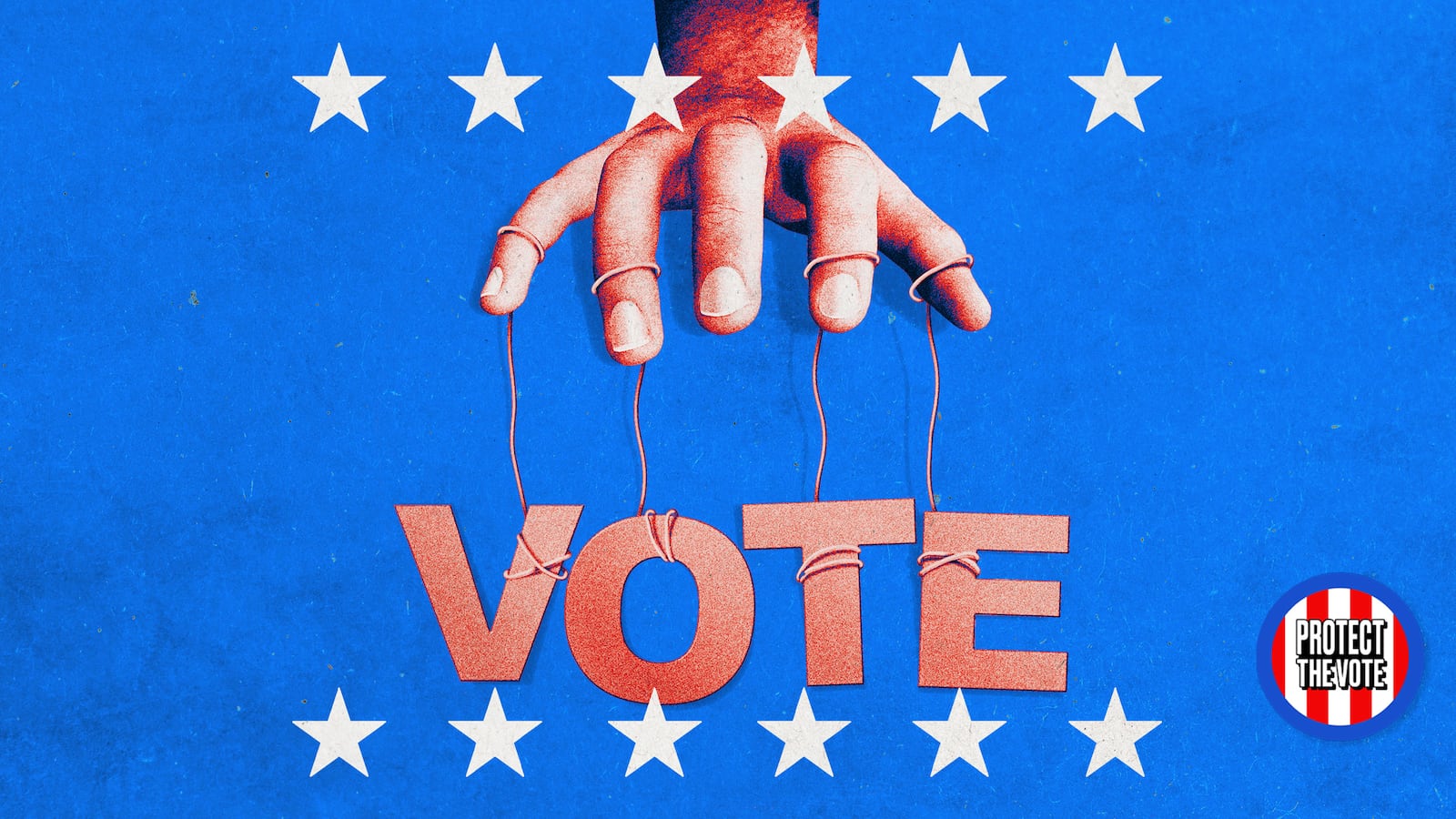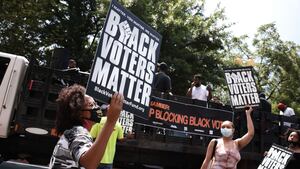For the first time since the passage of the 1965 Voting Rights Act, Southern state lawmakers can once again redesign election districts without federal oversight.
That means several GOP-dominated legislatures can shape state and congressional voting maps without first seeking approval from the U.S. Department of Justice or the U.S. District Court of Washington, D.C. Without the constraints of oversight, seven Southern states are alleged to have established racially discriminatory election maps: Alabama, Arkansas, Georgia, Mississippi, North Carolina, South Carolina, and Texas, according to the Brennan Center)" href="https://urldefense.com/v3/__https://www.brennancenter.org/our-work/research-reports/redistricting-mid-cycle-assessment__;!!LsXw!WzubUtHDMgFO57dIYE-G6M9DJV87zmtqT9rrRyU_6UPqDMVJF0dLvpn2IyifN_iIt_bD_pSsT-K_DLMDhS1FnXzeLH995JZ5tA$">Brennan Center, a public policy institute of New York University Law School.
Each of these states devised maps that raise concerns over the fair representation of Black communities in the legislatures and Congress. The districts were conceived under a system of discriminatory mapping known as gerrymandering)" href="https://urldefense.com/v3/__https://www.brennancenter.org/our-work/research-reports/gerrymandering-explained__;!!LsXw!WzubUtHDMgFO57dIYE-G6M9DJV87zmtqT9rrRyU_6UPqDMVJF0dLvpn2IyifN_iIt_bD_pSsT-K_DLMDhS1FnXzeLH8RCnsTSQ$">gerrymandering.
To challenge the denial of fair representation, Black voters across the South—and pro-democracy allies—are fighting back in the courts.
The Voting Rights Act (VRA) was one of the signature achievements of the Civil Rights Movement. It codified into federal law the protection of Black voters in the South, and by extension, minority voters in other regions. The law was anchored in the 15th Amendment)" href="https://urldefense.com/v3/__https://www.history.com/topics/black-history/fifteenth-amendment__;!!LsXw!WzubUtHDMgFO57dIYE-G6M9DJV87zmtqT9rrRyU_6UPqDMVJF0dLvpn2IyifN_iIt_bD_pSsT-K_DLMDhS1FnXzeLH8ZlRYzFA$">15th Amendment to the Constitution, ratified after the Civil War, which states: “The right of citizens of the United States to vote shall not be denied or abridged by the United States or by any State on account of race, color, or previous condition of servitude.”
The VRA)" href="https://urldefense.com/v3/__https://www.history.com/topics/black-history/voting-rights-act__;!!LsXw!WzubUtHDMgFO57dIYE-G6M9DJV87zmtqT9rrRyU_6UPqDMVJF0dLvpn2IyifN_iIt_bD_pSsT-K_DLMDhS1FnXzeLH_s6SqUDA$">VRA addressed the broad range of machinations used to suppress the Black vote under Jim Crow: poll taxes, white primaries, literacy tests, economic intimidation, beatings, and lynchings. For example, Section 2 of the law prohibits states and localities from devising qualifications or prior requirements that diminished the voting rights of minority communities; Section 5 required states with a history of discrimination to obtain federal “preclearance” before changing voter qualifications or districts.
Under the preclearance provision, Blacks were able to establish a foothold in local and county legislatures, and were on the verge of gaining statewide influence in the South. The law has been used to expand the political representation of marginalized groups through the establishment of majority-minority districts, minority-coalition districts, white cross-over districts, and districts with a reasonable degree of minority influence.
In recent years, however, VRA opponents found favor in the U.S. Supreme Court to prolong the old ways of white dominance.
The court in 2013 nullified Section 5 in a case known as Shelby County, Alabama v. Holder. The ruling released states from the obligation of preclearance.
Since then, the GOP South has engaged in wide-ranging attacks on Black voter participation. Until now, though, the legislatures have not had the chance to redesign maps of representation.
This changed with the 2020 Census, the data used to reformulate state and congressional districts every 10 years. Each district holds approximately equal populations; if shaped adequately, they can further the goals of “one person, one vote” and enable the representation of common interests and locations.
Such is not the case in the aforementioned Southern states. The Brennan Center suggested that rigged maps in Texas, North Carolina, and Georgia alone could potentially deny Black voters influence in up to nine congressional seats than under the preclearance requirements.
That’s because preclearance would have forestalled the dilution of Black representation through mechanisms such as “packing,” where minorities are concentrated in a few places with limited legislative presence; and “cracking,” where they are dispersed into many districts with little influence, according to “Power on the Line(s))" href="https://urldefense.com/v3/__https://www.naacpldf.org/redistricting-report/__;!!LsXw!WzubUtHDMgFO57dIYE-G6M9DJV87zmtqT9rrRyU_6UPqDMVJF0dLvpn2IyifN_iIt_bD_pSsT-K_DLMDhS1FnXzeLH_piLmgkg$">Power on the Line(s): Making Redistricting Work for Us,” a May 2021 report researched by the NAACP Legal Defense and Education Fund and other civil rights organizations.
It can take years, and tremendous efforts in the courts and on the streets, for communities to unwind the discriminatory effects of rigged election districts.
Take North Carolina, where the GOP responded to the 2010 census by devising a map for the state legislature that packed Black communities into fewer districts than justified by the population growth, according to a lawsuit filed by Black state voters and described in the NAACP LDF report.
The U.S. Supreme Court in 2017 ruled that North Carolina’s map was unconstitutional, but the victory came at an unacceptable cost. By the time of the SCOTUS ruling, the map had already been in place for years. During that period, the state GOP curtailed early voting, ended pre-registration for youths aged 16 and 17, eliminated same-day registration, and instituted a strict voter-ID requirement.
Following the 2020 Census—in which North Carolina’s population surge of almost a million residents earned the state a larger congressional apportionment—the GOP crafted maps that used packing and cracking schemes to dilute Black representation. Advocates successfully challenged the maps in the state courts)" href="https://urldefense.com/v3/__https://www.npr.org/2022/02/05/1078481564/north-carolina-redistricting__;!!LsXw!WzubUtHDMgFO57dIYE-G6M9DJV87zmtqT9rrRyU_6UPqDMVJF0dLvpn2IyifN_iIt_bD_pSsT-K_DLMDhS1FnXzeLH8i_49EtA$">state courts—and had the midterm primary elections delayed from March to May to litigate corrections.
Black voters in Alabama are also fighting back, contending in lawsuits that the state GOP failed to account for population growth in a new map for congressional districts. And most importantly for the representation of a Black community that comprises 27 percent of the electorate, a three-judge federal panel agreed with advocates that the Alabama GOP’s map violates the VRA and should be corrected. However, the U.S. Supreme Court overturned the ruling in a 5-4 decision)" href="https://urldefense.com/v3/__https://www.aclu.org/press-releases/comment-us-supreme-court-ruling-alabama-redistricting-case__;!!LsXw!WzubUtHDMgFO57dIYE-G6M9DJV87zmtqT9rrRyU_6UPqDMVJF0dLvpn2IyifN_iIt_bD_pSsT-K_DLMDhS1FnXzeLH8aBSwMZQ$">5-4 decision, allowing the maps to remain in effect while the case is litigated in the lower courts.
Meanwhile, in Georgia, voters are challenging the GOP-drawn maps for state and congressional districts. Causing notable controversy has been the packing of Black voters—and the cracking of other racial minority communities—in the suburban Atlanta congressional districts. (Blacks comprise about 35 percent of the Peach State population.) Advocates filed a lawsuit in federal court)" href="https://urldefense.com/v3/__https://www.ajc.com/politics/judge-wrestles-with-voting-rights-and-chaos-in-georgia-redistricting/W4D5MGT6RFCPRF227UJVOVXZ3Q/__;!!LsXw!WzubUtHDMgFO57dIYE-G6M9DJV87zmtqT9rrRyU_6UPqDMVJF0dLvpn2IyifN_iIt_bD_pSsT-K_DLMDhS1FnXzeLH9GKv7G2w$">lawsuit in federal court accusing the GOP legislature of diluting Black representation in Congress and in the state legislature.
It’s hard to believe we’re doing this again, but nearly six decades after President Lyndon B. Johnson signed the Voting Rights Act, Black voters still must advocate for districts that represent their interests. As in the past, the usual arenas of appeal are state and federal courts, local and state legislatures, mayors and governors. By December 2021, about 28 lawsuits were filed in objection to new congressional maps on the grounds of race discrimination, according to the Brennan Center.
And it all stems from the way that SCOTUS effectively neutered the VRA in 2013.
Congress had an opportunity to address the denial of the vote and representation in January by passing the “Freedom to Vote: John R. Lewis Act,” a merging of two Democrat-sponsored voting rights bills, the Freedom to Vote Act and the John Lewis Act. But the bill died on the Senate floor.
Had it passed, the law would have established new protections against racial discrimination in voting and election administration. The John Lewis Act alone would have rekindled provisions in the VRA weakened by the Supreme Court.
However, there is still a chance for Congress to revisit the issue and get it right. That chance is the bipartisan talks over a prospective bill known as the “Electoral Count Act,” which would reform how votes for president are verified by the Electoral College and certified by Congress—and to avoid a replay of the Jan. 6 insurrection chaos.
Still, the ECA may be the last best hope to address the discrimination in voting unleashed by the Supreme Court. Democrats and moderate Republicans must incorporate into any proposed bill the key provisions of the John Lewis Act. It’s time to end the racial chaos in our democratic system.








